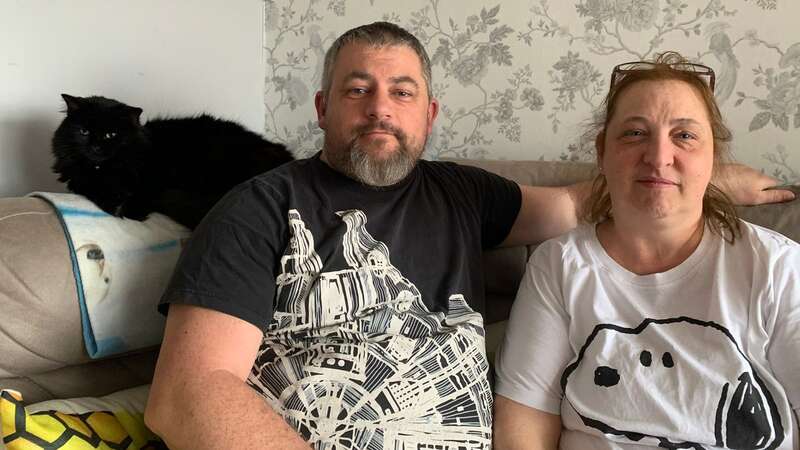
A deaf man was on the brink of having a testicle surgically removed without being fully aware of the risks due to a hospital error, as doctors failed to provide an interpreter for his consultation.
Andrew Wiley, 47, faced a harrowing ordeal at a Canterbury hospital in Kent when he went to have a benign cyst on his testicle examined. Despite his wife's advance request for an interpreter for the critical appointment, Andrew was left without one and had to resort to using pen and paper and lip-reading, rather than sign language, to understand what was happening.
It wasn't until two months later, with an interpreter finally present, that he became aware of the serious risks involved in the surgical removal of his testicle, leading him to opt out of the procedure.
Now, Andrew is sharing his story to raise awareness and prevent others from experiencing similar situations. He is calling for the NHS to improve services for those with hearing impairments.
Andrew said: "It makes me very angry. I've been let down. My issues would have been sorted out sooner if I was not deaf. I would have been understood and treated quicker."
 Brit 'saw her insides' after being cut open by propeller on luxury diving trip
Brit 'saw her insides' after being cut open by propeller on luxury diving trip
In February, Andrew visited Kent and Canterbury Hospital to discuss the cyst, where his wife Amanda, 50, had made multiple requests for an interpreter well in advance, in line with NHS policy.
However, no interpreter had been provided. The dad-of-one explained: "There were two doctors in the room. I was trying to lip-read, but it was really difficult as he had an accent. I was trying to explain to him how much pain I was in. It was difficult and I felt rushed."
Andrew, who communicates through British Sign Language, was informed that the veins around the lump causing his discomfort made its removal complex and that taking out the testicle might be a solution. He queried if removing the testicle would be the simplest option to alleviate his pain.
The consultant confirmed this and, unknown to Andrew at the time, scheduled him for the operation without further conversation. Mr Wiley expressed his frustration: "Did he explain to me the risks or complications like bleeding and so on? No, he did not. He didn't give me choices either, or even if he did, he didn't explain it properly for me to understand. I felt fobbed off... It felt like he wanted me to leave."
In April, Andrew revisited the hospital and spoke to the surgeon. That's when he found out the previous doctor had inaccurately recorded that he had requested the removal of his testicle. After being apprised of the potential complications of the surgery, he decided against having the procedure.
Andrew lamented the poor communication, stating: "It was just lack of communication. [The doctor] saying I was begging for testicle removal and not explaining to me about the risks and the complications. He knew talking to me would be pointless."
The pain caused by his condition has led to Andrew missing numerous hours of work as a freelance support worker for others with hearing loss. Despite his suffering, he has yet to receive any treatment due to the delays brought about by this miscommunication. The NHS is obligated to ensure that its services are equally accessible to all sections of society, according to its government constitution.
However, Andrew alleges that he's visited the doctors "many times" without being provided an interpreter. He recalls one instance when he went to the A&E department at Ashford's William Harvey Hospital in Kent due to chest pain and told the receptionist about his deafness.
After waiting several hours, another patient informed him that staff had been calling his name but had moved on to the next person when he didn't respond, he claims. Andrew stated: "Sometimes I can be independent and lip-read if I have a small problem. But something like this, I need help so I know what I'm getting myself into."
"In my line of work, I hear problems with interpreters all the time. I go to an appointment with a client and there isn't one. Sometimes they cry or break down because of it. I never thought I would be having to go through this for me. If you request an interpreter, one should be there. I have a lot of deaf friends and I hear it all the time."
 Cowboy gored to death by bull in New Year's Eve rodeo tragedy
Cowboy gored to death by bull in New Year's Eve rodeo tragedy
Amanda, the wife of a deaf patient, has slammed hospitals for their failure to provide interpreters, arguing that it prevents proper understanding of medical procedures and risks. She expressed her concern: "Especially appointments where you're having an operation and you're not properly explained what the risks are." She added, "If [the doctor] can't understand that properly, he can't make a decision."
Sarah Hayes, the chief nursing officer at East Kent Hospitals, issued an apology for the distress caused to Andrew during his appointment, admitting that the service was not up to par. "We are deeply sorry that Mr Wiley faced such difficulty at his appointment and for the distress this caused," she stated. Hayes emphasised the hospital's commitment to clear communication with patients, acknowledging that Andrew's experience did not meet their standards.
Read more similar news:
Comments:
comments powered by Disqus

































